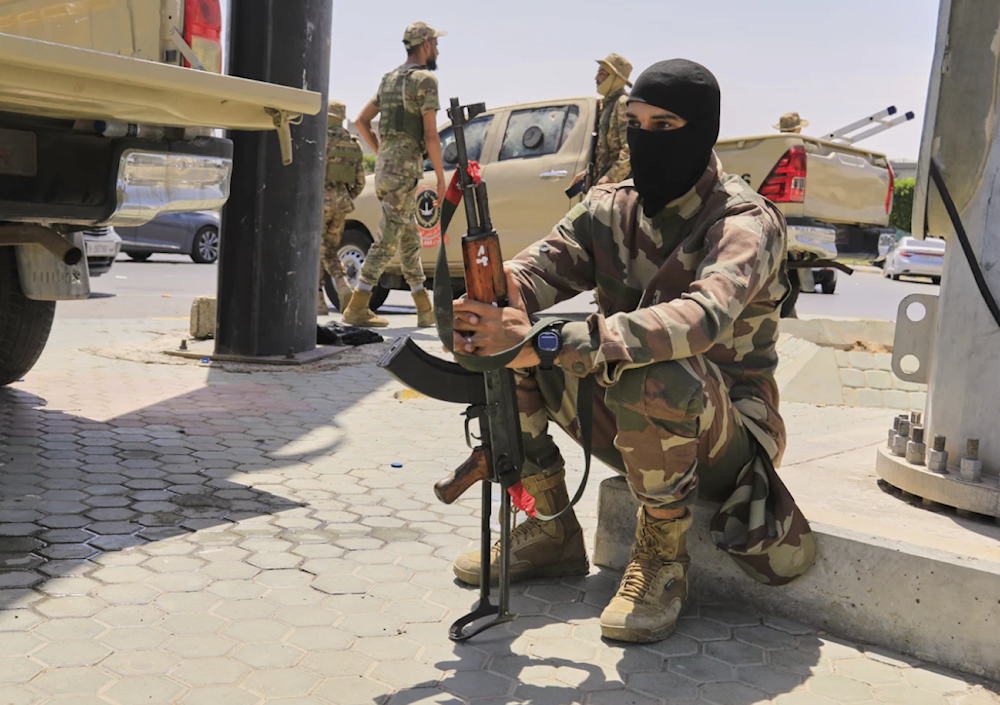Tunisian Foreign Ministry voices concern over violence in Tripoli
Clashes between rival armed groups in Tripoli have left at least six dead and deepened Libya’s political crisis, prompting international concern.
-

A Libyan soldier takes a rest near a checkpoint in Tripoli, Libya, on May 13, 2025. (AP)
The Tunisian Ministry of Foreign Affairs has expressed deep concern over the escalating security situation in the Libyan capital, Tripoli, as tensions continue to rise between rival factions.
Fighting erupted late Monday when the 444 Brigade, affiliated with the Ministry of Defense under the government of Abdul Hamid Dbeibah, launched operations against the Stability Support Apparatus. The clashes led to the death of Abdul Ghani al-Kikli, a prominent figure among the armed groups.
According to his family, al-Kikli was killed in an ambush when he entered a barracks controlled by the 444 Brigade, and hostilities continued until Tuesday, with at least six casualties reported.
In an official statement, the ministry called for “an immediate end to the escalation in all parts of Libya,” urging all parties to prioritize dialogue and stability. Tunisia reaffirmed its readiness to serve as a venue for intra-Libyan talks, under the auspices of the United Nations Support Mission in Libya (UNSMIL), in an effort to support a peaceful resolution to the conflict.
Meanwhile, the Libyan Supreme Council of State, led by Khaled Al-Mishri, issued a statement declaring that the National Unity Government, led by Abdul Hamid al-Dbeiba, has lost its legitimacy, further highlighting the deepening political divide in the country.
Demonstrators in Bani Walid and the Sabratha Municipal Council have both called for the overthrow of the Dbeibah government, demanding its departure and accountability.
Tripoli clashes leave 6 dead amid moves to disband armed group: Libya
The United Nations has expressed "grave concern" over the surge in violence in Tripoli, where a fragile calm followed 72 hours of intense clashes between rival armed groups.
The International Organization for Migration (IOM) called for "an immediate cessation of fighting to ensure the safety and well-being of civilians in accordance with international humanitarian law."
The IOM warned of the implications of the latest escalation, citing the mobilization of armed factions around the Libyan capital.
Despite a declared ceasefire, the Stability Support Apparatus vowed retaliation for the killing of its commander, stating it would "relentlessly" pursue those responsible.
Ceasefire declared amid ongoing tensions
By Wednesday, a cautious calm had returned to the streets of Tripoli, but the aftermath of the fighting was still evident. Schools, the University of Tripoli, and Mitiga Airport remained closed, along with most public institutions. According to Agence France-Presse (AFP), only a handful of local shops had reopened.
Turkey, a key backer of the Dbeibah government, announced it was preparing to evacuate its nationals from the capital amid growing fears of renewed violence.
Dbeibah announces crackdown on irregular armed groups
In a televised statement, Prime Minister Dbeibah framed the latest developments as "a decisive step toward eliminating irregular groups,” pledging that only state institutions would be permitted to operate in Libya.
His comments followed the retreat of key figures loyal to the late al-Kikli and signaled a renewed attempt to assert state authority over the fragmented security landscape.
Observers suggest that Dbeibah’s move is part of a broader strategy to consolidate control after years of accommodating powerful militias. Jalal Harchaoui, a Libya expert, warned that the situation may be even more volatile than previous crises in 2011, 2014, and 2019 due to the increased presence of armed groups in central Tripoli.

 3 Min Read
3 Min Read








